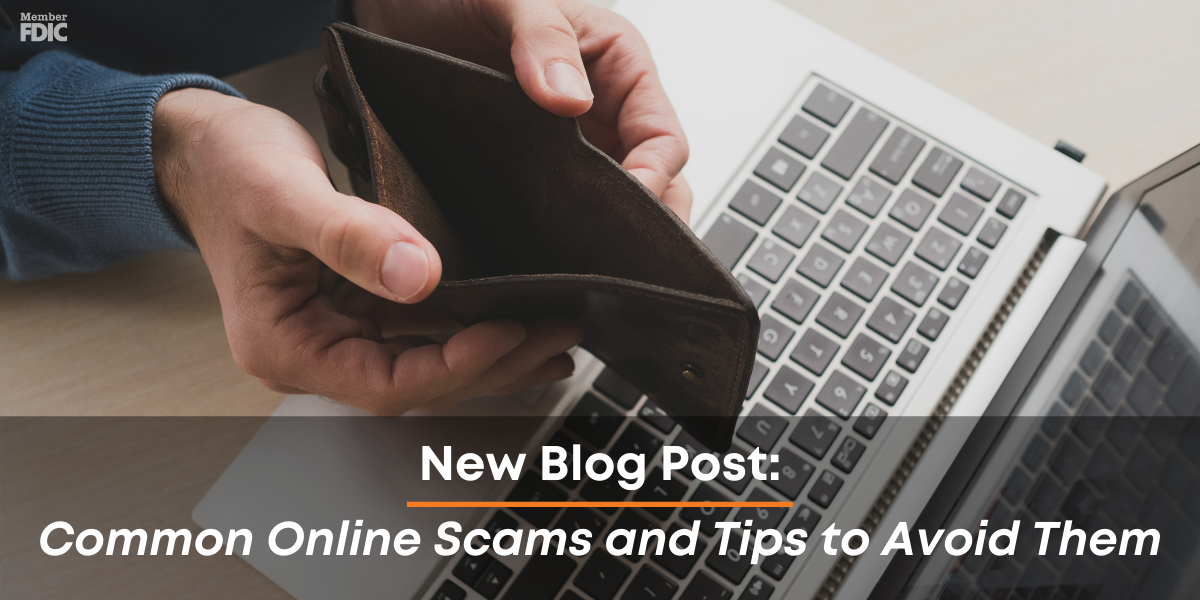Online scams are on the rise as cyber criminals are becoming more clever and more global. However, the intention stays the same with all of them: to trick you into giving away your money or information.
To follow are seven of the most common scams that happen daily and tips on how to stay safe and avoid being a victim.
- Card cracking
You’ve probably seen these types of ads or posts to make “easy money.” Criminals will use popular social media platforms like Facebook, Twitter, or Instagram to solicit consumers, and often target young adults.
Customers who respond are asked to provide a debit card, PIN, or online logins that give criminals access to their accounts. The trickster, with use this information to deposit fake checks and withdraw funds at an ATM. Then, the compromised customer will report stolen credentials or a lost credit card to their bank to get reimbursed for the funds. In exchange, the partner in crime will take a portion of the new funds and give the customer the rest.
Tip: If it’s too good to be true, it probably is. There is no such thing as making “easy money.” Knowingly depositing bad checks is illegal and can result in fines and criminal charges.
- Friend/Family member imposter
You may receive a call, text, email, or social media message that mentions specific details and information about you or your family, making it seem legit. The messenger will pose as a friend or family member and ask for money regarding an emergency–such as posting bail, paying a hospital bill, or being detained at an airport. They will request the money immediately and ask you to send it through a gift card, wire transfer, or other digital payment service.
Tip: Contact your friend or family member directly to confirm the caller’s story.
- Lottery or sweepstakes
You receive a phone call, email, or letter stating you have won a lottery or sweepstakes. Scammers will mention that it is “required” that you pay a fee to receive the prize to avoid taxes or additional fees.
Tip: Legitimate giveaways and lotteries pay taxes directly to the government, rather than being reimbursed from winners’ prize money.
- Online dating
Cyber criminals create fake profiles on online dating sites, social networks, and chat rooms to try to trick you into giving money. They first build an online relationship and eventually ask for help with their finances–requesting you to send money for a hardship or even for you to open an account on their behalf.
Tip: Do not give personal information, account numbers, or credit card information to someone you recently met online.
- Online job scams
You might see social media posts or openings on job sites that offer a high-paying gig with lots of “perks” (specifically working from home). The job might consist of advertising a company’s logo on your car, working as a personal assistant for someone who’s out of town, or being a secret shopper. Once hired, the criminal will “pay” you with a fake check, money order, or a deposit for more than your paycheck. They will then ask you to buy gift cards or pay someone else with the extra money.
Tip: Legit companies won’t pay you upfront or send extra money for gift cards.
- Online loan scams
A recent trend occurring on social media are posts impersonating a loan officer or company offering you credit. They may ask for a prepaid debit card or demand you to act immediately. Once given your financial info, the criminals will drain your bank account.
Tip: Do your due diligence and research the lender or loan broker using rating agencies, online reviews, and state and federal agencies like the FTC.
- Ransomware
The internet is never 100% safe, and you might accidentally download a type of malicious software to your computer or phone. This software then blocks your access to your operating system and steals your information stored on your device, (“holding it ransom”) until you pay the online criminal.
Tip: Back up your data regularly by syncing your files to a secure external drive or a backup cloud storage service and be wary of clicking on fishy links and ads.
At Bank of Southern California, we prioritize the security and safety of your accounts to make sure you have peace of mind. For more tips and resources on cybersecurity, visit our Recommended Reading page.
